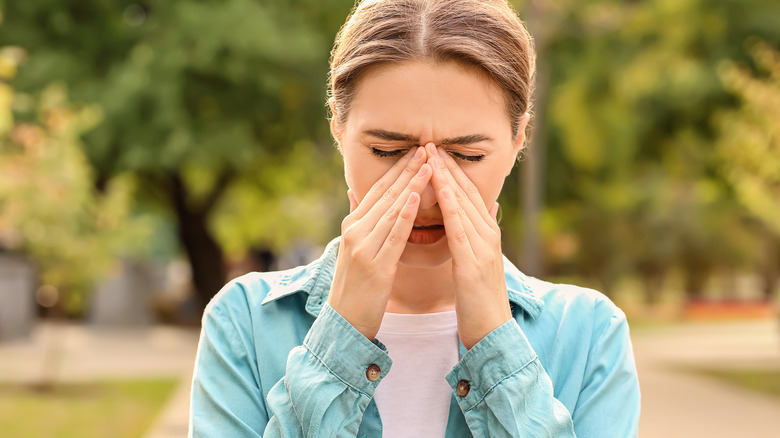What To Expect When You Go For Allergy Shots
Many people suffer from allergies, both as children and as adults. Something that causes an allergic reaction in someone is called an allergen, according to MedlinePlus. There are many allergens, but the most common ones are grass and tree pollen, dust mites, animal dander, some food, insect bites, latex, and mold. Typical symptoms of allergies can include sneezing; itching; runny or stuffy nose; and watery, red, or swollen eyes, says the Mayo Clinic.
There are a number of natural remedies that might help with allergies, such as taking a shower, washing your bedding, filtering the air, and some vitamins and supplements, explains Cleveland Clinic. However, if you've already tried these solutions and your allergies are still interfering with your daily life, you may want to look into allergen immunotherapy, also known as allergy shots. They are a series of shots taken over a long period of time that can provide relief from allergies, according to Healthline. But what can you expect when you go for allergy shots?
How allergy shots work
Allergy shots can help people by decreasing the symptoms associated with some allergens. Each allergy shot contains a small amount of the allergen so that your immune system improves its response to that allergen and fights against it. Over time, your body will learn to fight the allergen on its own, dramatically reducing the symptoms, says the American Academy of Allergy Asthma & Immunology (AAAAI).
Before your doctor provides allergy shots, she needs to know which allergens you are most susceptible to. Usually, you will receive a skin prick test in which different allergens are injected under your skin on your back or forearm while the doctor records the reactions, according to Healthline. During testing, you may become extremely itchy or have other symptoms. Once the doctor determines which allergens cause reactions, you will be sent to an allergist or immunologist to start allergy shot treatment.
Why allergy shots are a long-term commitment
Unfortunately, allergy shots are not like a vaccine in the sense of only taking one or two before your body is protected. They are a time commitment that can last up to five years, explains Healthline. Allergy treatment consists of two phases, the buildup phase and the maintenance phase.
The buildup phase requires the most time commitment. You will be going into the doctor's office once or twice a week for three to six months, building your body's resistance to the allergen, explains the AAAAI. Expect to be in the office for up to an hour as you will most likely need to stay there for 30 minutes after the injection so you can be monitored for side effects. The amount of allergen in each injection will increase during this time.
The maintenance phase begins after the buildup phase. During this time, you will be going into the doctor's office less often, about once every two to four weeks for four to five months, according to WedMD. After that, you will only get a shot once a month, which will continue for three to five years before you can finally stop taking the shots (via Healthline).



